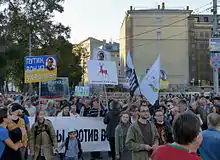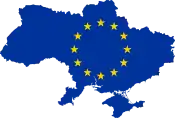2014 anti-war protests in Russia
The 2014 anti-war protests in Russia refers to a series of anti-war demonstrations opposing the Russian military intervention in Ukraine that took place in Russia in 2014. Protesters held two anti-war protest rallies on 2 and 15 March 2014. The latter, known as the March of Peace (Russian: Марш Мира, Marsh Mira), took place in Moscow a day before the Crimean referendum. The protests have been the largest in Russia since the 2011–13 Russian protests by the Russian opposition against the alleged electoral fraud committed by United Russia during the 2011 Russian legislative election. Reuters reported that around 20,000 people participated in the 15 March demonstrations.[5][4]
| 2014 anti-war protests in Russia | |||
|---|---|---|---|
| Part of the 2014 Crimean crisis and Russian opposition protest rallies | |||
.jpg.webp) At least 30,000 people with Russian and Ukrainian flags, flags of political parties and peace symbols. | |||
| Date | 2 & 15 March, 21 September 2014 | ||
| Location | |||
| Caused by |
| ||
| Goals |
| ||
| Methods |
| ||
| Parties to the civil conflict | |||
| |||
| Lead figures | |||
| Number | |||
| Wikinews has related news: |
| Wikimedia Commons has media related to 2014 anti-war protests in Russia. |
Timeline
On 1 March, five people who were picketing next to the Federation Council building against the invasion of Ukraine were arrested.[6] The next day about 200 people protested at the building of the Russian Ministry of Defense in Moscow against Russian military involvement.[7] About 500 people also gathered to protest on the Manezhnaya Square in Moscow and the same number of people on the Saint Isaac's Square in Saint Petersburg.[8] On 2 March, about eleven protesters demonstrated in Yekaterinburg against Russian involvement, with some wrapped in the Ukrainian flag.[9] On 15 March, for a rally in support of Ukraine in Yekaterinburg, according to various sources, between 400 and 600 people left,[10][11] including the Mayor of the city Yevgeny Roizman. Protests were also held in Chelyabinsk on the same day.[12] The opposition to the military intervention was also expressed by rock musician Andrey Makarevich, who wrote in particular: "You want war with Ukraine? It will not be the way it was with Abkhazia: the folks on the Maidan have been hardened and know what they are fighting for – for their country, their independence. [...] We have to live with them. Still neighborly. And preferably in friendship. But it's up to them how they want to live".[13] The Professor of the Department of Philosophy at the Moscow State Institute of International Relations Andrey Zubov was fired for his article in Vedomosti, criticizing Russian military intervention.[14]
On 2 March, one Moscow resident protested against Russian intervention by holding "Stop the war" banner, but he was immediately harassed by passers-by and when the police was arresting him, a woman offered to fabricate a serious charge (beating up a child) against him; however, the proposal was rejected by the police.[15] Andrei Zubov, a professor at the Moscow State Institute of International Relations, who compared Russian actions in Crimea to the Anschluss of Austria, was threatened. Alexandr Chuyev, the leader of the pro-Kremlin Spravedlivaya Rossiya party, also objected to Russian intervention in Ukraine. Boris Akunin, popular Russian writer, predicted that Russia's moves would lead to political and economic isolation.[15]
Protests against the Russian intervention also occurred outside Russian embassies in London, Berlin, Vilnius and Ankara on 2 March.[16]
March of Peace (15 March) protests
%252C_occupation_of_the_Crimea_is_a_shame_of_Russia.jpg.webp)
Protests against the Russian intervention in Crimea also took place in Cologne and outside the Russian Consulate in Bonn, Germany, on 15 March.[17]
In August, about a dozen activists were arrested outside the Ukrainian Embassy in Moscow for protesting against Russian president Vladimir Putin.[18]
21 September

Another anti-war rally with about 5,000 to 20,000 demonstrators took place on Pushkinskaya Square in Moscow on 21 September 2014.[1] The Washington Post reported that "tens of thousands" protested the war in Ukraine with a peace march in downtown Moscow "under heavy police supervision".[19] There were minor scuffles with pro-Russian supporters, but no serious violence or arrests were reported.[20] About a thousand people also gathered outside the Kazan Cathedral in Saint Petersburg to protest against Russia's involvement in Ukraine.[21]
Thousands of people around the world supported this event by holding anti-war demonstrations on the same day. In the US, San Francisco, New York, Washington DC, Los Angeles, Seattle, Houston and Boston took part in the protest activities.[22]
Anti-war congress
.jpg.webp)

On 19 March 2014, the anti-war congress of Russian intelligentsia took place in Moscow.[23] The memorandum issued by the Congress, proclaims:
We, the representatives of the Russian intelligentsia feel ourselves obliged to warn the authorities from making historical mistake – the desire to take control of a part of Ukraine, the country which was considered as a brotherly one.
Open letter by Russian scientists
On 19 March 2014, a group of Russian scientists published an open letter to the Russian Ministry of Communications. The letter demanded the Ministry to check the television programs of Dmitry Kiselev for signs of extremism and incitement of ethnic hatred.[24]
See also
References
- Ukraine crisis: Thousands march in Moscow anti-war rally, BBC News, 21 September 2014, retrieved 22 September 2014
- Russia Update: Paid Protesters, Ultranationalist Groups, State Workers March Against Maidan, The Interpreter (Institute of Modern Russia), February 21, 2015.
- "Dozens Detained at Anti-War Rallies". Moscow Times. 3 March 2014. Retrieved 17 March 2014.
- "Ukraine crisis triggers Russia's biggest anti-Putin protest in two years". Reuters. 15 March 2014. Retrieved 16 March 2014.
- Anti-war protesters march through Moscow
- "In Russia were detained activists who protested against the war with Ukraine". Ukrainian Independent Information Agency. 1 March 2014.
- "На антивоенных акциях в Москве задержаны 300 человек (Na antivoyennykh aktsiyakh v Moskve zaderzhany 300 chelovek)" [At the anti-war actions in Moscow detained 300 people] (in Russian). RU: Utro. Retrieved 2 March 2014.
- "В Москве и Перебурге проходят митинги против российской оккупации Крыма. Уже есть задержанные (V Moskve i Peterburge prokhodyat mitingi protiv rossiyskoy okkupatsii Kryma. Uzhe yest' zaderzhannyye)" [In Moscow and St. Petersburg rallies against the Russian occupation of the Crimea. Already have detained] (in Russian). Центр журналистских расследований (Tsentr zhurnalistskikh rassledovaniy) [Center for Investigative Journalism]. Retrieved 2 March 2014.
- "Жители Екатеринбурга провели пикеты против ввода российских войск в Крым (Zhiteli Yekaterinburga proveli pikety protiv vvoda rossiyskikh voysk v Krym)" [Inhabitants of Ekaterinburg picketed against Russian troops in the Crimea]. Komsomolskaya Pravda (in Russian). RU. Retrieved 2 March 2014.
- "Слава Украине!" по-московски: мнения и оценки "Марша мира"
- Бунт против Путина? Мэр Екатеринбурга Ройзман возглавил «украинский» пикет и получил татарский торт. «Полагаю, это серьезный удар по отношениям мэрии Екатеринбурга и Москвы». ФОТО
- ""Сколько детей ты готов похоронить, чтобы Крым стал частью России?" Первые антивоенные пикеты прошли на Урале ("Skol'ko detey ty gotov pokhoronit', chtoby Krym stal chast'yu Rossii?" Pervyye antivoyennyye pikety proshli na Urale)" ["How many children are you willing to bury to Crimea became part of Russia?" First anti-war pickets were held in the Urals] (in Russian). RU: Ura. Retrieved 2 March 2014.
- "Не стреляй! Шевчук, Гребенщиков, Макаревич. Антивоенная риторика (Ne strelyay! Shevchuk, Grebenshchikov, Makarevich. Antivoyennaya ritorika)" [Do not shoot! Shevchuk, Grebenshikov Makarevich. antiwar rhetoric]. Novaya Gazeta (in Russian). Retrieved 4 March 2014.
- Bershidsky, Leonid (25 March 2014). "Comparing Putin to Hitler Will Get You Fired". bloomberg.com. Retrieved 25 March 2014.
- "Ukraine crisis: Russians opposed to Putin". BBC News Magazine. 12 March 2014.
- Ukraine Crisis, Avax News, 2 March 2014, retrieved 22 September 2014
- Anti-Russia protests in Germany, Deutsche Welle, 15 March 2014, retrieved 24 May 2014
- "Anti-Ukraine war activists arrested for protest in Moscow". London: Telegraph. 13 August 2014. Retrieved 22 September 2014.
- Demirjian, Karoun (21 September 2014). "Russian peace march draws tens of thousands in support of Ukraine". Washington Post. Retrieved 23 September 2013.
- Thousands March Against War In Moscow, St. Petersburg, Radio Free Europe Radio Liberty, 22 September 2014
- Thousands march in Moscow against Kremlin role in Ukraine strife, Channel NewsAsia, 22 September 2014
- "Timeline Photos – Russian Americans in Support of Ukraine – Facebook". Retrieved 14 October 2014.
- "Congress of Intelligentsia against War meets in Moscow". Retrieved 14 October 2014.
- "Russian Scientists ask to check Kiselev". Archived from the original on 19 April 2014. Retrieved 14 October 2014.

.jpg.webp)